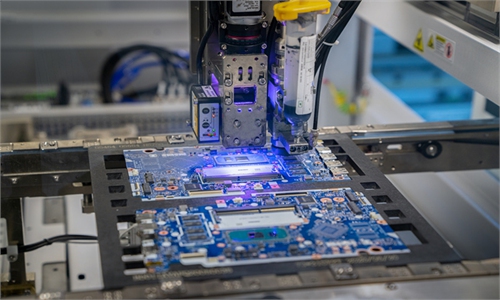Potential tighter ban of AI chip exports to China to forfeit future of US chipmakers: experts

A view of Alibaba's AI chip Hanguang 800 Photo: Courtesy of Alibaba
While the US media continues to report about a potential visit to China by the US Treasury Secretary Janet Yellen, the Biden administration, however, is reportedly considering a tighter export restriction of artificial intelligence (AI) chips to China, a move experts warned could forfeit the future of American chipmakers.
Further restricting semiconductor exports to China, in fact, is cultivating Chinese competitors for US producers, experts said, noting that AI chips is one of the earliest semiconductors that Chinese developers could realize massive production.
The US Commerce Department could move as soon as early July, possibly after Yellen's visit to China, to halt chip exports "by Nvidia and other chipmakers to customers in China and other countries of concern without first obtaining a license," the Wall Street Journal reported, citing anonymous sources.
Nvidia's A800 chips, a less-advanced version which rolled out specifically for the Chinese market after US export control measures were announced in October 2022, will be banned from shipping to China under the new curb, according to the report.
It will hurt US chipmakers' interests eventually who have been selling about 30 percent of their products to the Chinese market, Gao Lingyun, an expert at the Chinese Academy of Social Sciences in Beijing, told the Global Times on Wednesday.
The US companies could not afford losing the Chinese market, and they know clearly about it, echoed Ma Jihua, a veteran technology expert.
Washington may keep rolling out such restrictions, but implementation will be anything but an easy task as they will face strong resistance from US companies, Ma said.
In a recent interview with the Financial Times, Nvidia Chief Executive Jensen Huang said that the existing export controls could cause "enormous damage" to the US tech industry. Huang said they had left his company with its "hands tied behind our back" by preventing Nvidia from selling its most advanced chips to China, the Financial Times reported.
Per estimation by Boston Consulting Group, US companies could lose 18 percent of their global market share and 37 percent of revenues if the US completely bans semiconductor companies from selling to Chinese customers, resulting in a loss of 15,000 to 40,000 highly skilled jobs.
From 5G to semiconductor and AI, the US has been expanding its crackdown on Chinese high-tech sectors in recent years.
In October 2022, the US announced sweeping new export controls on advanced computing and semiconductor manufacturing items to China. Later in April 2023, it roped in Japan and Netherlands to its export control clique.
According to media reports, the Biden administration has also been mulling restrictions on American investments in China. More than 1,000 Chinese companies have been blacklisted by the Biden administration, news reports said.
The current Biden administration has been tilting too much toward political considerations, which goes against basic principles of economic development, Gao said.
When talking about Yellen's upcoming visit, Gao noted that her mission would be hawking of US national debt. "The US sells 30 percent of its national debt overseas, and right now there aren't many countries which have spare capacity to buy new bonds."
In fact, Yellen has been a technocrat and is believed to have a fair understanding of China-US economic and trade relations, experts said, noting that, regretfully, she has been caught in the middle of anti-China hawks in Washington.
By tightening exports controls during Yellen's possible visit to China, the US may intend to gain some bargaining chips. However, "to me, it just seems that Washington's all tricks have been exhausted," Gao said.
It would be just naïve if the US attempts to breach China's bottom line through such moves, Gao said.
There is nothing wrong with wanting to be in the lead on the high-tech front, but the right way to achieve it is through fair competition, rather than doing whatever it takes just to maintain its tech hegemony and deprive other countries of the right to development, still less should the US seek its own interests at the expense of the global industrial and supply chains which will deal a blow to the already fragile world economy, Mao Ning, a spokesperson for China's Foreign Ministry said on March 6.



